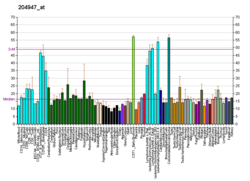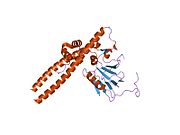Protein-coding gene in the species Homo sapiens
Transcription factor E2F1 is a protein that in humans is encoded by the E2F1 gene .[5]
Function [ edit ] The protein encoded by this gene is a member of the E2F family of transcription factors . The E2F family plays a crucial role in the control of cell cycle and action of tumor suppressor proteins and is also a target of the transforming proteins of small DNA tumor viruses. The E2F proteins contain several evolutionarily conserved domains found in most members of the family. These domains include a DNA binding domain , a dimerization domain which determines interaction with the differentiation regulated transcription factor proteins (DP), a transactivation domain enriched in acidic amino acids, and a tumor suppressor protein association domain which is embedded within the transactivation domain. This protein and another 2 members, E2F2 and E2F3, have an additional cyclin binding domain. This protein binds preferentially to retinoblastoma protein pRB in a cell-cycle dependent manner. It can mediate both cell proliferation and p53 -dependent/independent apoptosis .[6]
Transcription [ edit ] E2F1 promoter[PAX8] => E2F1[7]
Interactions [ edit ] E2F1 has been shown to interact with:
ARID3A ,[8] CUL1 ,[9] Cyclin A1 ,[10] Cyclin A2 ,[11] GTF2H1 ,[12] MDM4 ,[13] NCOA6 ,[14] NDN ,[15] [16] NPDC1 ,[17] PURA ,[18] PHB ,[19] [20] [21] [22] RB1 ,[15] [23] [24] [25] [26] [27] [28] UDG ,[29] RBL1 ,[23] SKP2 ,[9] SP1 ,[30] [31] [32] SP2 ,[30] SP3 ,[30] SP4 ,[30] TFDP1 [8] [28] [33] [34] TOPBP1 ,[35] [36] TP53BP1 ,[26] UBC .[37]
See also [ edit ]
References [ edit ]
^ a b c GRCh38: Ensembl release 89: ENSG00000101412 - Ensembl , May 2017^ a b c GRCm38: Ensembl release 89: ENSMUSG00000027490 - Ensembl , May 2017^ "Human PubMed Reference:" . National Center for Biotechnology Information, U.S. National Library of Medicine .^ "Mouse PubMed Reference:" . National Center for Biotechnology Information, U.S. National Library of Medicine .^ Neuman E, Sellers WR, McNeil JA, Lawrence JB, Kaelin WG (December 1996). "Structure and partial genomic sequence of the human E2F1 gene". Gene . 173 (2): 163–9. doi :10.1016/0378-1119(96)00184-9 . PMID 8964493 . ^ "Entrez Gene: E2F1 E2F transcription factor 1" .^ Li CG, Nyman JE, Braithwaite AW, Eccles MR (December 2011). "PAX8 promotes tumor cell growth by transcriptionally regulating E2F1 and stabilizing RB protein" . Oncogene . 30 (48): 4824–34. doi :10.1038/onc.2011.190 . PMC 3229668 PMID 21602887 . ^ a b Suzuki M, Okuyama S, Okamoto S, Shirasuna K, Nakajima T, Hachiya T, Nojima H, Sekiya S, Oda K (August 1998). "A novel E2F binding protein with Myc-type HLH motif stimulates E2F-dependent transcription by forming a heterodimer" . Oncogene . 17 (7): 853–65. doi :10.1038/sj.onc.1202163 PMID 9780002 . ^ a b Marti A, Wirbelauer C, Scheffner M, Krek W (May 1999). "Interaction between ubiquitin-protein ligase SCFSKP2 and E2F-1 underlies the regulation of E2F-1 degradation". Nat. Cell Biol . 1 (1): 14–9. doi :10.1038/8984 . PMID 10559858 . S2CID 8884226 . ^ Yang R, Müller C, Huynh V, Fung YK, Yee AS, Koeffler HP (March 1999). "Functions of cyclin A1 in the cell cycle and its interactions with transcription factor E2F-1 and the Rb family of proteins" . Mol. Cell. Biol . 19 (3): 2400–7. doi :10.1128/mcb.19.3.2400 . PMC 84032 PMID 10022926 . ^ Xu M, Sheppard KA, Peng CY, Yee AS, Piwnica-Worms H (December 1994). "Cyclin A/CDK2 binds directly to E2F-1 and inhibits the DNA-binding activity of E2F-1/DP-1 by phosphorylation" . Mol. Cell. Biol . 14 (12): 8420–31. doi :10.1128/MCB.14.12.8420 . PMC 359381 PMID 7969176 . ^ Vandel L, Kouzarides T (August 1999). "Residues phosphorylated by TFIIH are required for E2F-1 degradation during S-phase" . EMBO J . 18 (15): 4280–91. doi :10.1093/emboj/18.15.4280 . PMC 1171504 PMID 10428966 . ^ Strachan GD, Jordan-Sciutto KL, Rallapalli R, Tuan RS, Hall DJ (February 2003). "The E2F-1 transcription factor is negatively regulated by its interaction with the MDMX protein" . J. Cell. Biochem . 88 (3): 557–68. doi :10.1002/jcb.10318 . PMID 12532331 . S2CID 38805122 . ^ Kong HJ, Yu HJ, Hong S, Park MJ, Choi YH, An WG, Lee JW, Cheong J (November 2003). "Interaction and functional cooperation of the cancer-amplified transcriptional coactivator activating signal cointegrator-2 and E2F-1 in cell proliferation". Mol. Cancer Res . 1 (13): 948–58. PMID 14638867 . ^ a b Taniura H, Taniguchi N, Hara M, Yoshikawa K (January 1998). "Necdin, a postmitotic neuron-specific growth suppressor, interacts with viral transforming proteins and cellular transcription factor E2F1" . J. Biol. Chem . 273 (2): 720–8. doi :10.1074/jbc.273.2.720 PMID 9422723 . ^ Kuwako K, Taniura H, Yoshikawa K (January 2004). "Necdin-related MAGE proteins differentially interact with the E2F1 transcription factor and the p75 neurotrophin receptor" . J. Biol. Chem . 279 (3): 1703–12. doi :10.1074/jbc.M308454200 PMID 14593116 . ^ Sansal I, Dupont E, Toru D, Evrard C, Rouget P (October 2000). "NPDC-1, a regulator of neural cell proliferation and differentiation, interacts with E2F-1, reduces its binding to DNA and modulates its transcriptional activity" . Oncogene . 19 (43): 5000–9. doi :10.1038/sj.onc.1203843 PMID 11042687 . ^ Darbinian N, Gallia GL, Kundu M, Shcherbik N, Tretiakova A, Giordano A, Khalili K (November 1999). "Association of Pur alpha and E2F-1 suppresses transcriptional activity of E2F-1" . Oncogene . 18 (46): 6398–402. doi :10.1038/sj.onc.1203011 PMID 10597240 . ^ Joshi B, Ko D, Ordonez-Ercan D, Chellappan SP (December 2003). "A putative coiled-coil domain of prohibitin is sufficient to repress E2F1-mediated transcription and induce apoptosis". Biochem. Biophys. Res. Commun . 312 (2): 459–66. doi :10.1016/j.bbrc.2003.10.148 . PMID 14637159 . ^ Fusaro G, Dasgupta P, Rastogi S, Joshi B, Chellappan S (November 2003). "Prohibitin induces the transcriptional activity of p53 and is exported from the nucleus upon apoptotic signaling" . J. Biol. Chem . 278 (48): 47853–61. doi :10.1074/jbc.M305171200 PMID 14500729 . ^ Wang S, Zhang B, Faller DV (June 2002). "Prohibitin requires Brg-1 and Brm for the repression of E2F and cell growth" . EMBO J . 21 (12): 3019–28. doi :10.1093/emboj/cdf302 . PMC 126057 PMID 12065415 . ^ Wang S, Nath N, Fusaro G, Chellappan S (November 1999). "Rb and prohibitin target distinct regions of E2F1 for repression and respond to different upstream signals" . Mol. Cell. Biol . 19 (11): 7447–60. doi :10.1128/mcb.19.11.7447 . PMC 84738 PMID 10523633 . ^ a b Dyson N, Dembski M, Fattaey A, Ngwu C, Ewen M, Helin K (December 1993). "Analysis of p107-associated proteins: p107 associates with a form of E2F that differs from pRB-associated E2F-1" . J. Virol . 67 (12): 7641–7. doi :10.1128/JVI.67.12.7641-7647.1993 . PMC 238233 PMID 8230483 . ^ Nicolas E, Ait-Si-Ali S, Trouche D (August 2001). "The histone deacetylase HDAC3 targets RbAp48 to the retinoblastoma protein" . Nucleic Acids Res . 29 (15): 3131–6. doi :10.1093/nar/29.15.3131 . PMC 55834 PMID 11470869 . ^ Pardo PS, Leung JK, Lucchesi JC, Pereira-Smith OM (December 2002). "MRG15, a novel chromodomain protein, is present in two distinct multiprotein complexes involved in transcriptional activation" . J. Biol. Chem . 277 (52): 50860–6. doi :10.1074/jbc.M203839200 PMID 12397079 . ^ a b Choubey D, Li SJ, Datta B, Gutterman JU, Lengyel P (October 1996). "Inhibition of E2F-mediated transcription by p202" . EMBO J . 15 (20): 5668–78. doi :10.1002/j.1460-2075.1996.tb00951.x . PMC 452311 PMID 8896460 . ^ Fajas L, Paul C, Zugasti O, Le Cam L, Polanowska J, Fabbrizio E, Medema R, Vignais ML, Sardet C (July 2000). "pRB binds to and modulates the transrepressing activity of the E1A-regulated transcription factor p120E4F" . Proc. Natl. Acad. Sci. U.S.A . 97 (14): 7738–43. Bibcode :2000PNAS...97.7738F . doi :10.1073/pnas.130198397 PMC 16614 PMID 10869426 . ^ a b Wu CL, Zukerberg LR, Ngwu C, Harlow E, Lees JA (May 1995). "In vivo association of E2F and DP family proteins" . Mol. Cell. Biol . 15 (5): 2536–46. doi :10.1128/mcb.15.5.2536 . PMC 230484 PMID 7739537 . ^ Walsh M, Shue G, Spidoni K, Kapoor A (March 1995). "E2F-1 and a cyclin-like DNA repair enzyme, uracil-DNA glycosylase, provide evidence for an auto-regulatory mechanisms for transcription" . J. Biol. Chem . 270 (10): 5289–98. doi :10.1074/jbc.270.10.5289 PMID 7534293 . ^ a b c d Rotheneder H, Geymayer S, Haidweger E (November 1999). "Transcription factors of the Sp1 family: interaction with E2F and regulation of the murine thymidine kinase promoter". J. Mol. Biol . 293 (5): 1005–15. doi :10.1006/jmbi.1999.3213 . PMID 10547281 . ^ Lin SY, Black AR, Kostic D, Pajovic S, Hoover CN, Azizkhan JC (April 1996). "Cell cycle-regulated association of E2F1 and Sp1 is related to their functional interaction" . Mol. Cell. Biol . 16 (4): 1668–75. doi :10.1128/MCB.16.4.1668 . PMC 231153 PMID 8657142 . ^ Karlseder J , Rotheneder H, Wintersberger E (April 1996). "Interaction of Sp1 with the growth- and cell cycle-regulated transcription factor E2F" . Mol. Cell. Biol . 16 (4): 1659–67. doi :10.1128/mcb.16.4.1659 . PMC 231152 PMID 8657141 .^ Sardet C, Vidal M, Cobrinik D, Geng Y, Onufryk C, Chen A, Weinberg RA (March 1995). "E2F-4 and E2F-5, two members of the E2F family, are expressed in the early phases of the cell cycle" . Proc. Natl. Acad. Sci. U.S.A . 92 (6): 2403–7. Bibcode :1995PNAS...92.2403S . doi :10.1073/pnas.92.6.2403 PMC 42492 PMID 7892279 . ^ Helin K, Wu CL, Fattaey AR, Lees JA, Dynlacht BD, Ngwu C, Harlow E (October 1993). "Heterodimerization of the transcription factors E2F-1 and DP-1 leads to cooperative trans-activation" . Genes Dev . 7 (10): 1850–61. doi :10.1101/gad.7.10.1850 PMID 8405995 . ^ Liu K, Lin FT, Ruppert JM, Lin WC (May 2003). "Regulation of E2F1 by BRCT domain-containing protein TopBP1" . Mol. Cell. Biol . 23 (9): 3287–304. doi :10.1128/mcb.23.9.3287-3304.2003 . PMC 153207 PMID 12697828 . ^ Yu X, Chini CC, He M, Mer G, Chen J (October 2003). "The BRCT domain is a phospho-protein binding domain". Science . 302 (5645): 639–42. Bibcode :2003Sci...302..639Y . doi :10.1126/science.1088753 . PMID 14576433 . S2CID 29407635 . ^ Zhou F, Zhang L, Wang A, Song B, Gong K, Zhang L, Hu M, Zhang X, Zhao N, Gong Y (May 2008). "The association of GSK3 beta with E2F1 facilitates nerve growth factor-induced neural cell differentiation" . J. Biol. Chem . 283 (21): 14506–15. doi :10.1074/jbc.M706136200 PMID 18367454 .
Further reading [ edit ]
Dupont E, Sansal I, Toru D, Evrard C, Rouget P (1997). "[Identification of NPDC-1, gene involved in the control of proliferation and differentiation of neural and glial precursors]". C. R. Séances Soc. Biol. Fil . 191 (1): 95–104. PMID 9181131 . Stevens C, La Thangue NB (2005). "The emerging role of E2F-1 in the DNA damage response and checkpoint control" . DNA Repair (Amst.) . 3 (8–9): 1071–9. doi :10.1016/j.dnarep.2004.03.034 . PMID 15279795 . Zhang Z, Wang H, Li M, Rayburn E, Agrawal S, Zhang R (2006). "Novel MDM2 p53-independent functions identified through RNA silencing technologies". Ann. N. Y. Acad. Sci . 1058 (1): 205–14. Bibcode :2005NYASA1058..205Z . doi :10.1196/annals.1359.030 . PMID 16394138 . S2CID 35683657 . Schild C, Wirth M, Reichert M, Schmid RM, Saur D, Schneider G (July 2009). "PI3K signaling maintains c-myc expression to regulate transcription of E2F1 in pancreatic cancer cells". Mol. Carcinog . 48 (12): 1149–58. doi :10.1002/mc.20569 . PMID 19603422 . S2CID 41545085 .
External links [ edit ]
(1) Basic domains
(1.1) Basic leucine zipper (bZIP )(1.2) Basic helix-loop-helix (bHLH )
Group A Group B Group CPAS Group D Group E Group F
(1.3) bHLH-ZIP (1.4) NF-1 (1.5) RF-X (1.6) Basic helix-span-helix (bHSH)
(2) Zinc finger DNA-binding domains
(2.1) Nuclear receptor (Cys4 )
subfamily 1 subfamily 2 subfamily 3 subfamily 4 subfamily 5 subfamily 6 subfamily 0
(2.2) Other Cys4 (2.3) Cys2 His2 (2.4) Cys6 (2.5) Alternating composition (2.6) WRKY
(4) β-Scaffold factors with minor groove contacts
(0) Other transcription factors
This article incorporates text from the United States National Library of Medicine , which is in the public domain .







